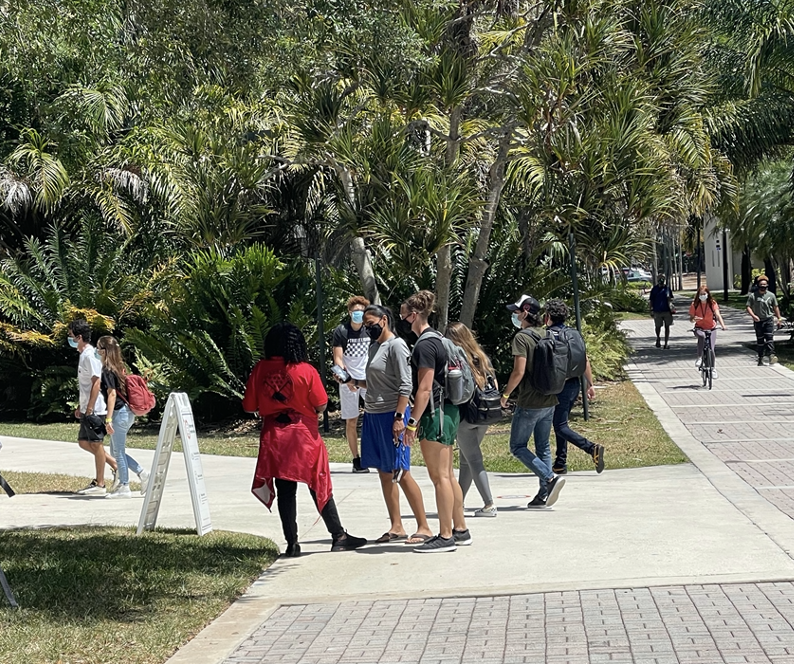Every class day on the Coral Gables and Rosenstiel campuses, roughly 6,500 students, faculty and staff have been stopped to see if they have had exposure to COVID or if they are having any virus-related symptoms.
Thank the 30 symptom checkers stationed at campus entrances and other locations who are helping the university minimize the number of COVID cases in the campus community. Their job is to hand out a quick, four-question survey to as many people as they can. If the respondents say they are OK, the checkers give them a wristband to continue on into campus.
But after three months of adhering to the protocol, some students are not so thankful and say they are getting weary of the process.

The Miami Hurricane recently spent two days around campus observing student/symptom checker interactions and noted that students often try to avoid the checkers by lowering their heads or focusing on their cellphones, hoping to slip by.
The avoidance maneuvers may or may not work, depending on the symptom checkers, some of whom are more aggressive than others in making sure the surveys are completed.
Some students say the symptom checkers have become more assertive toward the end of the semester.
“At the beginning of the semester, I would walk past some of the daily symptom checker workers because I hadn’t filled mine out yet,” said freshman Jaylen Dibble. “They would be fine with me filling it out on the way past them and getting it checked by the next person. Now they chase me down.”
The symptom checker employees were present for a portion of the fall semester, and the program was reinstituted for spring, with a modified staff of 20 on the weekends, the university said. Weekend totals average about half the daily number of completed surveys.
Symptom checkers say they were not allowed to speak to The Hurricane, but administrators acknowledge that while students may feel inconvenienced, they have to deal with the reality of being in a campus community that is responding to a deadly pandemic.
“By this point in the semester, we expect that students are used to interacting with the program personnel, recognize it is in place for their safety and that of the campus community, and will show their ‘Good to Go’ QR code when asked,” said Matthew Shpiner, the university’s executive director of emergency management.
Tathan Martell, a senior sociology major, said despite the university’s intentions to ensure campus safety, the system could be flawed.
“I think students don’t really care most of the time and just try and give an answer that is needed instead of their actual well-being,” Martell said.
Connor McVea, a freshman finance major, agrees.
“Just because there is a survey for our protection doesn’t mean every student values it the way they should,” McVea said. “They can easily answer the survey with untruthful answers just to make sure they get the QR code to be allowed on campus.”
Freshman Daniel Bron said he prefers to complete the survey when he is stopped after leaving Mahoney Residential College on his way to classes. But other students do not want to be bothered at all, he said.
“I even know of some kids who use screenshots of other people’s surveys so they don’t have to log on with their Cane ID to complete it themselves,” said Bron, an international business major.
"avoid it" - Google News
May 05, 2021 at 05:34AM
https://ift.tt/3uwWT5y
Students grow weary of daily symptom checker, some find ways to avoid it altogether - The Miami Hurricane
"avoid it" - Google News
https://ift.tt/3844a1y
https://ift.tt/2SzWv5y

No comments:
Post a Comment